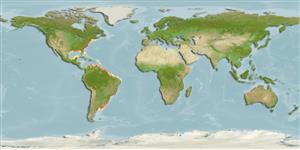Пластиножаберные (акулы и скаты) (sharks and rays) >
Myliobatiformes (Stingrays) >
Myliobatidae (Eagle and manta rays)
Etymology: Myliobatis: Greek, mylo = mill + Greek, + Greek, batis,-idos = a ray (Raja sp.) (Ref. 45335).
More on author: Lesueur.
Environment: milieu / climate zone / depth range / distribution range
экология
морской; солоноватоводный донно-пелагический; пределы глубины 0 - 100 m (Ref. 57911), usually 1 - 10 m. Subtropical; 43°N - 42°S, 97°W - 33°W
Western Atlantic: continental waters from Cape Cod to southeastern Florida (?) in the USA; also southern Brazil to Argentina (Ref. 58839). Reported (but not known for certain) from Gulf of Mexico, Florida and Caribbean islands, and northern South America. Often confused with Myliobatis goodei (Ref. 3173).
Length at first maturity / Size / Вес / Возраст
Maturity: Lm 65.0, range 60 - 70 cm
Max length : 129 cm WD самец/пол неопределен; (Ref. 49746); common length : 70.0 cm WD самец/пол неопределен; (Ref. 5217)
Disk broad with long sharply pointed wings and projecting snout. Tail very long, Few middorsal spines on disk in adults (Ref. 7251). Greyish, reddish chocolate or dusky brown above. Lower surface either pure white or whitish. Teeth green (Ref. 6902).
Found frequently in coastal waters to 10 m depth, mainly in shallow estuaries. Capable of traveling long distances, occasionally leaps out of the water. Swims in midwater. Cruises slowly over the bottom, rooting out bivalves with its beak and wings when feeding (Ref. 7251). Ovoviviparous (Ref. 50449).
Exhibit ovoviparity (aplacental viviparity), with embryos feeding initially on yolk, then receiving additional nourishment from the mother by indirect absorption of uterine fluid enriched with mucus, fat or protein through specialised structures (Ref. 50449).
Robins, C.R. and G.C. Ray, 1986. A field guide to Atlantic coast fishes of North America. Houghton Mifflin Company, Boston, U.S.A. 354 p. (Ref. 7251)
Статус Красного Списка МСОП (Ref. 130435)
Угроза для людей
Harmless
Использование человеком
рыболовство: не имеет хозяйственного значения
дополнительная информация
инструменты
Специальные отчеты
Скачать в формате XML
ресурсы в Интернет
Estimates based on models
Preferred temperature (Ref.
123201): 14.2 - 28.1, mean 24.2 °C (based on 594 cells).
Phylogenetic diversity index (Ref.
82804): PD
50 = 0.5002 [Uniqueness, from 0.5 = low to 2.0 = high].
Bayesian length-weight: a=0.00389 (0.00123 - 0.01235), b=3.08 (2.82 - 3.34), in cm total length, based on LWR estimates for this (Sub)family-body shape (Ref.
93245).
Trophic level (Ref.
69278): 3.4 ±0.0 se; based on diet studies.
устойчивость к внешним воздействиям (Ref.
120179): очень низкий, минимальное время удвоения популяции более 14 лет (Fec=4-8).
Fishing Vulnerability (Ref.
59153): Very high vulnerability (83 of 100).
Nutrients (Ref.
124155): Calcium = 17.7 [3.0, 78.8] mg/100g; Iron = 0.619 [0.159, 1.673] mg/100g; Protein = 21.5 [16.5, 26.6] %; Omega3 = 0.259 [0.074, 0.765] g/100g; Selenium = 23.1 [6.7, 60.5] μg/100g; VitaminA = 10.5 [4.4, 24.4] μg/100g; Zinc = 0.737 [0.363, 1.334] mg/100g (wet weight);
